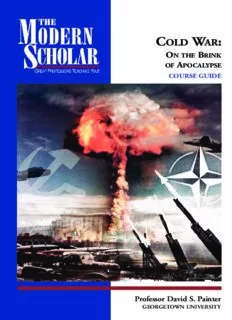
Cold war : on the brink of apocalypse PDF
Preview Cold war : on the brink of apocalypse
C W : OLD AR ON THE BRINK OF APOCALYPSE COURSE GUIDE Professor David S. Painter GEORGETOWNUNIVERSITY Cold War: On the Brink of Apocalypse Professor David S. Painter GeorgetownUniversity RecordedBooks™isatrademarkof RecordedBooks,LLC.Allrightsreserved. ColdWar: OntheBrinkofApocalypse ProfessorDavidS.Painter (cid:1) ExecutiveProducer JohnJ.Alexander ExecutiveEditor DonnaF.Carnahan RECORDING Producer-DavidMarkowitz Director-MatthewCavnar COURSEGUIDE Editor-JamesGallagher ContributingEditor- KarenSparrough Design-EdwardWhite Lecturecontent©2005byDavidS.Painter Courseguide©2005byRecordedBooks,LLC 7 2005byRecordedBooks,LLC Coverimage:©Clipart.com #UT071 ISBN:978-1-4193-5881-4 Allbeliefsandopinionsexpressedinthisaudio/videoprogramandaccompanyingcourseguide arethoseoftheauthorandnotofRecordedBooks,LLC,oritsemployees. CourseSyllabus ColdWar: OntheBrinkofApocalypse AboutYourProfessor...................................................................................................4 Introduction...................................................................................................................5 Lecture1 HiroshimaandtheOriginsoftheColdWar...........................................6 Lecture2 TheSuperpowersandtheWorldin1945............................................10 Lecture3 TheStruggleforEurope......................................................................16 Lecture4 GlobalizingtheColdWar.....................................................................22 Lecture5 TheKoreanWarandChangingPowerBalances...............................27 Lecture6 TurmoilintheThirdWorld...................................................................32 Lecture7 TheCubanMissileCrisis.....................................................................38 Lecture8 TheTurbulent1960s...........................................................................43 Lecture9 OriginsofDétente................................................................................48 Lecture10 RevolutionintheThirdWorldandtheEndofDétente........................53 Lecture11 TheArmsRaceandtheBreakdownofDétente..................................59 Lecture12 TheReaganOffensive.........................................................................64 Lecture13 GorbachevandtheEndoftheColdWar............................................70 Lecture14 UnderstandingtheColdWar...............................................................75 CourseMaterials........................................................................................................81 3 About Your Professor David S. Painter Painter Charles and Flora © ProfessorPainterteachesinternationalhistoryintheEdmundA.Walsh SchoolofForeignServiceatGeorgetownUniversity.Hispublicationsinclude OilandtheAmericanCentury:ThePoliticalEconomyofUSForeignOil Policy,1941–1954(1986);OriginsoftheColdWar:AnInternationalHistory (co-editor,2nded.,2005);TheColdWar:AnInternationalHistory(1999),and articlesontheColdWar,oilandworldpolitics,andUSpolicytowardthe ThirdWorld. ProfessorPainterreceivedhisundergraduateeducationatKingCollege.He continuedhisstudiesatOxfordUniversity,wherehewasaRhodesScholar, andattheUniversityofNorthCarolinaatChapelHill,wherehereceivedhis Ph.D.inUnitedStateshistory. Youwillgetthemostoutofthiscourseifyoureadthefollowingbooks: DavidS.Painter’sTheColdWar:AnInternationalHistoryandMelvynP. LefflerandDavidS.Painter’s(eds.)OriginsoftheColdWar:An InternationalHistory. 4 m Clipart.co © Introduction ThedevastatingUSatomicbombingoftheJapanesecitiesofHiroshimaand NagasakinotonlybroughtWorldWarIItoanend,buteffectivelygavebirthto theColdWar.Thepostwarworldwouldthereafterbemarkedbythefragilerela- tionshipoftwosuperpowerswithopposingideologies:theUnitedStatesandthe SovietUnion. Forforty-fiveyears,thesetwosuperpowerswouldvieforsupremacyinworld politics.TheColdWar,definedbyeventssuchastheCubanMissileCrisis,tur- moilintheThirdWorld,andthearmsrace,heldthepotentialforanapocalyptic confrontationthatcouldhavespelleddoomforthehumanrace.Understanding theColdWar,withallofitsfar-reaching,globalimplications,isabsolutelyessen- tialtoourunderstandingofthehistoryofthesecondhalfofthetwentiethcentury andbeyond. 5 Lecture1: HiroshimaandtheOriginsoftheColdWar TheSuggestedReadingforthislectureisJ.SamuelWalker’sPrompt andUtterDestruction:TrumanandtheUseoftheAtomicBombs AgainstJapan. TheUSatomicbombingsoftheJapanesecitiesofHiroshimaandNagasaki inAugust1945werekeyeventsinthehistoryofthepost-WorldWarIIworld. Theattacks,whichtookthelivesofover200,000people,mostlycivilians, markedtheendofWorldWarIIandthebeginningoftheColdWar.Thecon- troversyarousedbyaproposedexhibitattheSmithsonianInstitutionin1995 markingthe50thanniversaryoftheattacksdemonstratedthatthebombings ofHiroshimaonAugust6,1945,and,threedayslater,ofNagasaki,continue toraiseimportantmoralaswellasdiplomaticandstrategicissues.Thecontro- versyalsorevealedawidedivergencebetweenpopularperceptionsofthese eventsandtheviewsofmostscholars. TheDecisiontoUsetheAtomicBomb TounderstandtheUSdecisiontouseatomicbombsagainstJapanandhow itaffectedthepostwarworld,onehastobeginwithFranklinD.Roosevelt. PresidentRooseveltmadeaseriesofdecisionsthatconstitutedalegacythat significantlyshapedandlimitedtheoptionsavailabletohissuccessor,Harry S.Truman.TheUSprogramtobuildatomicweapons,theManhattanProject, wasdriveninitiallybythefearthatNaziGermanywasdevelopingsuch weapons.FromtheoutsetUSpolicymakersviewedtheatomicbombasa legitimateweaponofwarfarethatwouldbeusedwhenitwasready.Second, wellbeforetheattacksonHiroshimaandNagasaki,thedistinctionbetween civilianandmilitarytargetshadbeeneffectivelyerasedastheUnitedStates andtheotherparticipantsinthewarhadengagedinareabombingofurban andindustrialareas.Third,althoughUSandBritishscientistsworkedclosely togethertobuildatomicweapons,PresidentRooseveltdecidednottoshare informationaboutthebombwithhisotherally,theSovietUnion.Roosevelt andBritishleaderWinstonChurchillbelievedthatpossessionofatomic weaponswouldenhanceUSandBritishstrengthandbargainingleveragein thepostwarworldandoffsettoanextentsuchSovietadvantagesasman- powerandlocationintheheartofEurasia.Finally,RooseveltandUSmilitary leadersfollowedastrategyofminimizingUScasualtiesthroughoutthewar. ThecontextinwhichUSdiscussionsaboutusingtheatomicbombagainst Japantookplacewasalsoimportant.Thespringof1945sawtheendofthe warinEurope,thebloodyclimaxofthewarinthePacific,theemergenceof E problemsbetweentheWesternalliesandtheSovietUnion,andthesuccess- N O fulcompletionofUSeffortstobuildanatomicbomb.Thus,theUSdecision E touseatomicweaponsagainstJapantookplaceattheintersectionofWorld R U WarIIandtheColdWar. T C E L 6 AContinuingControversy Overthepastfortyyears,scholarshaveincreasinglychallengedthewide- spreadbelief,fosteredbythewritingsofparticipantsandtheirsupporters, thatthedecisiontouseatomicweaponsagainstJapanwasamilitarydeci- sionaimedatendingthewarquicklyandminimizingUScasualties. Accordingtothetraditionalview,useoftheatomicbombwasjustified becauseJapanwasnotpreparedtosurrenderandtheonlyalternativewasa potentiallycostlyinvasionofJapan.InadditiontopointingoutthatRoosevelt andChurchillbelievedthatpossessionofatomicweaponsgavetheWest leverageovertheSovietUnionandwithheldinformationaboutthebombfrom theirwartimeally,scholarshavenotedthatTrumanpostponedthePotsdam Conferenceuntilthefirsttestofthebomb.Duringtheconference,theUnited StatesshiftedfromfavoringSovietentryintothewaragainstJapantoapoli- cyoftryingtoendthewarbeforetheSovietscouldmakegainsinAsia.On thebasisofcontemporaryplanningdocuments,scholarshavealsodemon- stratedthattheestimatesofUScasualtiesresultingfromaninvasionof Japancitedinearlyaccountsbyparticipantswerevastlyinflated.Somehave suggestedthattheinflatedfiguresweregiventojustifyuseofthebomb. ScholarsalsopointoutthattheUnitedStatesusedatomicweaponsinearly AugustbeforeSovietentryintothewarandwellbeforetheplannedinvasion ofJapaninNovember.Finally,scholarshavenotedthattherewereother alternativestoaninvasion,includingcontinuingconventionalbombingand theblockadeofJapan,waitingtoseewhatimpactSovietentryintothewar wouldhaveonJapan’sleaders,modifyingthedemandforunconditionalsur- render,andanon-combatdemonstrationoftheatomicbomb. RecentscholarshiphasshownthatJapaneseleaders,includingEmperor Hirohito,werenotpreparedtosurrenderbeforeHiroshimaeventhoughthey clearlyrecognizedthatJapanhadlostthewar.Evenaftertheattackon Hiroshima,someJapanesemilitaryleaderswantedtocontinuethewar.It tookthecombinedimpactofHiroshimaandSovietentryintothewartoforce Japantosurrender. ANewConsensus Althoughcontroversystillexistsamongscholars,anewconsensushas beguntoemerge.First,scholarsemphasizethemomentumgeneratedbythe assumptionthattheatomicbombwasalegitimateweaponofwarthatshould beused.Indeed,ratherthanadecisiontousethebomb,therewasnodeci- sionnottouseit.Second,comparedtotheotheralternativestoaninvasion ofJapan,usingtheatomicbombhadthegreatadvantageofendingthewar quicklywithminimalUScasualties.Everydaythewarcontinued,moreUS servicepersonneldied.Continuingthewarwasalsoverycostlyinmonetary terms,threatenedtounderminepublicsupportforthewar,andtiedupUS militaryassetsinAsiawhentheycouldbeusedelsewhere.Endingthewar quicklyalsohaddiplomaticadvantages,asitpromisedtolimitSovietgainsin Asia.SomeUSpolicymakersalsohopeditwouldputpressureonthe SovietstolimittheirgainsinEuropebybolsteringWesternstrength.Many peopleintheUnitedStatesalsosawuseofthebombagainstJapanasjust retributionfortheJapaneseattackonPearlHarborandJapanesetreatment ofUSandalliedprisonersofwar.Somepolicymakerswereevenconcerned 7 thatunlessthebombwasusedtherewouldbepubliccriticismofthemassive amountsofresourcespouredintoitsdevelopment. ThecostsoftheatomicattacksonHiroshimaandNagasakiwerehigh.First, therearethe200,000liveslostintheattacksandtheirimmediateaftermath. Second,itisclearthatUSuseofthebombandUSpolicyregardingatomic weaponsexacerbatedtensionswiththeSovietUnionandfueledanarms race.PossessionofthebomblessenedtheneedfortheRedArmytohelp controlGermany,andthusmadetheUnitedStateslesswillingtoacquiesce inaSovietsphereofinfluenceinEasternEuropeortoacceptSoviet advancesintheMiddleEastorAsia.ThebombstiffenedSovietdetermina- tiontocontrolEasternEuropeandotherborderareasbecauseoftheneedto extendtheirdefensesagainstanairattack.TheUSatomicmonopolyalso madetheSovietslesswillingtocompromiseonkeyissueslesttheyappear intimidatedandthusinvitefurtherpressure.Finally,USpossessionanduse ofatomicweaponsincreasedSovietdeterminationtodeveloptheirown atomicarsenal. AlthoughfarfewerpeoplediedasaresultoftheHiroshimaandNagasaki attacksthanwouldhavediedintheeventofanalliedinvasionofthe Japaneseislands,suchaninvasionwasanunlikelypossibility.Still,itispos- sibletoarguethatendingthewarquicklywithatomicweaponssavedthe livesofthousandsofsoldiersandcivilians,includingJapanesesoldiersand civilians,andciviliansinoccupiedareaswhoweredyingeverydaythewar continued.Finally,afterlearningofthemassivedestructionandlossoflife causedbytheattackonHiroshima,PresidentTrumanorderedthatnomore atomicattacksbelaunchedwithouthisexpressauthorization.Japansurren- deredonAugust15,andatomicweaponshaveneveragainbeenusedin combat.That,perhaps,istheonegreatgainfromtheiruseinAugust1945. E N O E R U T C E L 8 FORGREATERUNDERSTANDING (cid:1) Questions 1.WhatfactorslaybehindtheUnitedStates’sdecisiontouseatomic weaponsinJapan? 2.WhatweretheoutcomesoftheuseofatomicweaponsagainstJapan in1945? Suggested Reading Walker,J.Samuel.PromptandUtterDestruction:TrumanandtheUseof theAtomicBombsAgainstJapan.Revisededition.ChapelHill,NC: UniversityofNorthCarolinaPress,2005. Other Books of Interest Hogan,MichaelJ.,ed.HiroshimainHistoryandMemory.NewYork: CambridgeUniversityPress,1996. Sherwin,MartinJ.AWorldDestroyed:HiroshimaandItsLegacies.Third ed.Stanford,CA:StanfordUniversityPress,2003. Walker,J.Samuel.“RecentLiteratureonTruman’sAtomicBombDecision: ASearchforMiddleGround.”DiplomaticHistory29(April2005):311–34. 9
